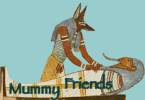Common Egyptian Phrases
Enjoy sharing these phrases with your friends! Don't worry about how they are pronounced, as long as you can understand each other.
![]()
![]()
em hotep
"Em hotep" is the most common of Egyptian greetings. It means "in peace" and is used when meeting or parting. The word "hotep" (peace) comes from the verb "hotep" which means "be satisfied, be happy". This was often used in Egyptian names, following the name of a god. For example, the name "Amenhotep" means "Amen is satisfied". So when you wish someone "em hotep!", you are not only wishing them peace, you are also wishing them happiness.
![]()
![]()
![]()
![]()
ii-ti
ii-wey
"Ii-ti!" (hello!) and "ii-wey!" (welcome!) are essentially the same greeting, but ii-wey is more emphatic. They both have the literal meaning "you have come!" and are both used when speaking to someone who is arriving. The person who is arriving would probably say "em hotep!".
![]()
![]()
![]()
![]()
![]()
![]()
nefer sedjmek
nefer sedjmetj
"Nefer sedjmek!" and "nefer sedjmetj" both mean "may your hearing be beautiful". "Nefer sedjmek" is used when speaking to a man and "nefer sedjmetj" when speaking to a woman. Less litterally, the idea is "may you hear only good things" and implies a wish for good luck.
This is a phrase used when parting and is the most common way to end a letter.
![]()
dewa-netjer
"Dewa-netjer" literally means "Praise God!" and is used as we would commonly use "thank god". The Egyptians were a very devout people and it was the custom to praise and thank god at the end of a journey, after enduring some hardship or avoiding some danger, or on the arrival of success or good news. The hieroglyph shows the standard posture for praising god, standing with both arms raised up in front of you. When using this phrase, the names of specific gods are not mentioned.
![]()
![]()
![]()
![]()
dewa-netjer en-ek
dewa-netjer en-etj
"Dewa-netjer en-ek" (when speaking to a male) and "dewa-netjer en-etj" (when speaking to a female) are used to mean "thank you". Literally they both mean "praise God for you", and again no specific god is mentioned by name.
![]()
![]()
![]()
![]()
em heset net Imen
"Em heset net Imen!" means "May you be in favor with Amun!" This is a common greeting and is often used in the opening of letters. The name of the god Amun may be replaced with any other relevant god (such as Ra, Montu, Isis, etc.) though it is usually the local god of the recipient of the letter or greeting.







